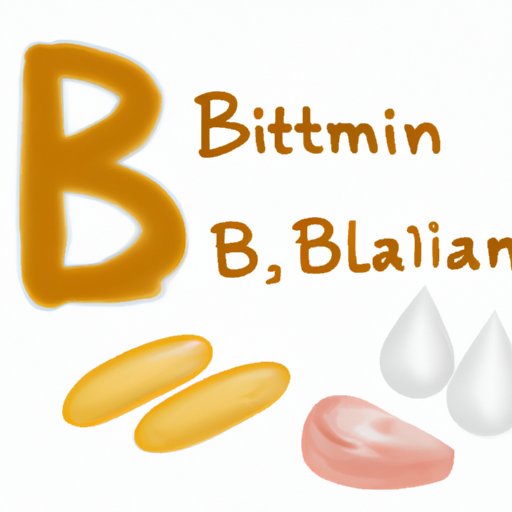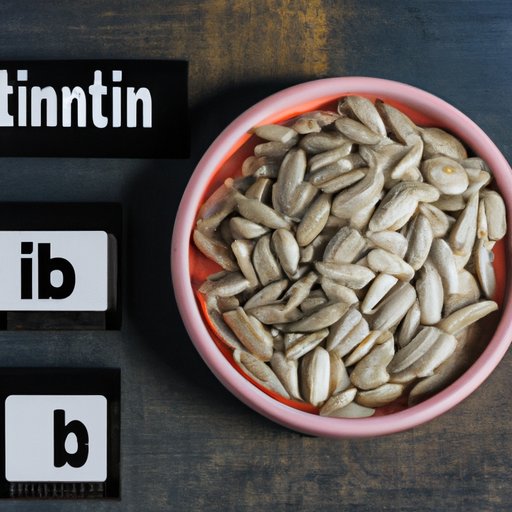
Introduction
Vitamin B1, also known as thiamine, is an essential nutrient that helps convert food into energy and supports healthy heart, muscle, and nerve function. Despite its importance, many people don’t get enough vitamin B1 in their diets, which can lead to various health problems. In this article, we’ll explore the top foods high in vitamin B1 and ways to incorporate them into your daily meals for optimal health.
Top 10 Foods High in Vitamin B1 for a Healthy Diet
Here are ten foods that are naturally high in vitamin B1:
- Pork: A 3-ounce serving of pork provides about 0.8-1.0 mg of vitamin B1, which is over half of the recommended daily intake for adults. Pork tenderloin, pork chops, and ham are all excellent sources of vitamin B1.
- Sunflower seeds: A quarter cup of sunflower seeds contains about 0.4-0.5 mg of vitamin B1. You can snack on roasted sunflower seeds or add them to soups, salads, and baked goods for a nutrient boost.
- Macadamia nuts: One ounce of macadamia nuts provides about 0.2-0.3 mg of vitamin B1. You can enjoy macadamia nuts as a snack or use them in sweet and savory dishes.
- Beans: Various types of beans, such as black beans, navy beans, and lentils, are rich in vitamin B1. A cup of cooked beans contains about 0.2-0.3 mg of vitamin B1, along with fiber, protein, and other nutrients.
- Whole grains: Whole wheat, oats, and brown rice are excellent sources of vitamin B1, with a cup of cooked whole grains providing about 0.1-0.2 mg of vitamin B1. Replace refined grains with whole grains to boost your vitamin B1 intake.
- Asparagus: One cup of cooked asparagus provides about 0.1-0.2 mg of vitamin B1, along with vitamin C, folate, and other beneficial compounds. Roast, grill, or steam asparagus to enjoy its tasty and nutritious benefits.
- Brussels sprouts: These little green gems are packed with vitamin B1, with a cup of cooked Brussels sprouts containing about 0.1-0.2 mg of vitamin B1. Roast or sauté Brussels sprouts with garlic and olive oil for a delicious side dish.
- Spinach: Dark leafy greens like spinach are a good source of vitamin B1, with a cup of cooked spinach providing about 0.1-0.2 mg of vitamin B1. Use spinach as a base for salads, smoothies, or omelets.
- Yeast: Nutritional yeast is a popular ingredient among vegans and vegetarians due to its cheesy flavor and high nutrient content. Two tablespoons of nutritional yeast provide about 0.1-0.2 mg of vitamin B1, as well as protein and B vitamins.
- Acorn squash: One cup of cooked acorn squash provides about 0.1-0.2 mg of vitamin B1, along with vitamin A, potassium, and fiber. Bake acorn squash with cinnamon and honey for a comforting and nutritious dessert.
To meet your daily vitamin B1 needs, aim for at least 1.1-1.2 mg for women and 1.2-1.4 mg for men. Pregnant and breastfeeding women may need more vitamin B1, so consult your healthcare provider for recommendations.
Fortunately, incorporating these foods into your diet isn’t too difficult. Try adding sunflower seeds to your morning oatmeal, snacking on roasted macadamia nuts, using beans in soups and stews, and replacing refined grains with whole grains. You can also experiment with new recipes featuring these vitamin B1-rich foods.
Vitamin B1: The Essential Nutrient Found in These Foods
Vitamin B1 plays a crucial role in energy metabolism, helping the body convert carbohydrates into glucose, which fuels our cells for work and play. Vitamin B1 also supports healthy nerve function by aiding in the synthesis of neurotransmitters, such as acetylcholine and gamma-aminobutyric acid (GABA), which transmit signals between the brain and body.
In addition, vitamin B1 is needed for a healthy heart, as it helps regulate heartbeat and prevent heart failure. Vitamin B1 also supports muscle function, especially in the legs, by aiding in the synthesis of adenosine triphosphate (ATP), which supplies energy to muscles during exercise.
Foods high in vitamin B1 also offer other health benefits. For instance, whole grains and beans are rich in fiber, which promotes digestive health and prevents constipation. Nuts and seeds are high in healthy fats and antioxidants, which reduce inflammation and lower the risk of chronic diseases, such as heart disease and cancer. Asparagus and Brussels sprouts are cruciferous vegetables that are rich in sulforaphane, a compound that has anticancer and anti-inflammatory properties.
While vitamin B1 supplements are available, most people can get enough vitamin B1 through a balanced diet. However, certain groups, such as alcoholics, elderly individuals, and people with certain medical conditions, may be at risk of vitamin B1 deficiency and may benefit from supplementation. Consult your healthcare provider if you suspect you have a vitamin B1 deficiency or have questions about supplementation.
Boost Your Health with These Vitamin B1 Rich Foods
Vitamin B1 is essential for overall health and well-being, and consuming foods high in vitamin B1 can help boost your physical and mental performance. Vitamin B1 also supports a healthy metabolism, leading to better energy, focus, and endurance.
To enjoy the health benefits of vitamin B1-rich foods, here are some recipe and meal ideas:
- Pork stir-fry with asparagus and brown rice: Cut pork tenderloin into bite-size pieces and stir-fry with garlic, ginger, and diced asparagus. Serve with cooked brown rice.
- Black bean and corn salad: Combine cooked black beans, corn, diced tomatoes, red onion, cilantro, and lime juice for a refreshing and nutritious salad.
- Sunflower seed butter toast: Spread sunflower seed butter on whole-grain toast and top with sliced banana and cinnamon for a quick and healthy breakfast.
- Spinach and feta omelet: Whisk eggs with chopped spinach and crumbled feta cheese, and cook in a non-stick skillet until set.
- Macadamia-crusted salmon: Coat salmon fillets with crushed macadamia nuts and bake until golden and flaky.
Keep in mind that variety is key to a healthy diet, so try to include a mix of vitamin B1 foods in your meals. You can also experiment with adding herbs and spices, such as curry powder and cumin, to your vitamin B1-rich dishes for extra flavor and nutrition.
Add These Vitamin B1 Foods to Your Diet for Optimal Health
A balanced diet that includes a variety of foods from each food group is essential for good health. In addition to consuming vitamin B1 foods, aim to eat plenty of fruits, vegetables, lean proteins, and healthy fats for optimal nutrition.
Here are some suggestions for incorporating vitamin B1 foods into your daily meals:
- Top whole-grain cereal with sliced bananas and sunflower seeds for a vitamin B1-rich breakfast.
- Snack on roasted chickpeas or edamame for a fiber and protein boost.
- Make a vegetarian taco bowl with black beans, brown rice, diced tomatoes, avocado, and cilantro.
- Blend spinach, pineapple, and ginger for a refreshing green smoothie.
- Try making your own nut butter with macadamia nuts, almonds, or peanuts.
Additionally, be mindful of your food choices and avoid processed and high-sugar foods, which can lead to nutrient deficiencies and chronic diseases.
How to Get Enough Vitamin B1: The Foods You Need to Eat
The recommended daily intake of vitamin B1 varies depending on age, sex, and other factors. However, in general, adults should aim for at least 1.1-1.4 mg of vitamin B1 per day. Pregnant women may need more vitamin B1, and breastfeeding women should consume about 1.4-1.5 mg of vitamin B1 daily.
To ensure you get enough vitamin B1 in your diet, focus on eating a varied and balanced diet that includes fruits, vegetables, whole grains, lean proteins, and healthy fats. Choose foods that are naturally high in vitamin B1, rather than relying on supplements, which may have side effects and interactions with other medications.
Additionally, certain factors can affect vitamin B1 absorption and utilization, such as alcohol consumption, high-carbohydrate diets, and certain medications. If you have any concerns about your vitamin B1 status, consult your healthcare provider for advice.
Finally, be mindful of foods that can interfere with vitamin B1 absorption, such as tea, coffee, and raw fish. While it’s okay to consume these foods in moderation, avoid consuming them in large quantities or as a main source of vitamin B1.

From Pork to Sunflower Seeds: A Guide to Vitamin B1 Rich Foods
There’s a wide variety of foods that contain vitamin B1, making it easy to obtain this essential nutrient through food. Whether you prefer pork chops, sunflower seeds, or Brussels sprouts, there’s a vitamin B1 food for everyone.
Here’s a summary of the highest vitamin B1 foods:
- Pork
- Sunflower seeds
- Macadamia nuts
- Beans
- Whole grains
- Asparagus
- Brussels sprouts
- Spinach
- Yeast
- Acorn squash
Try incorporating these foods into your meals for optimal nutrition and health. Don’t be afraid to experiment with new recipes and flavors, and have fun fueling your body with delicious and nutritious vitamin B1 foods.
Fuel Your Body with These Delicious Vitamin B1 Foods
In conclusion, vitamin B1 is a vital nutrient that supports energy metabolism, healthy nerve and muscle function, and heart health. To ensure you get enough vitamin B1 in your diet, incorporate a variety of vitamin B1 foods, such as pork, seeds, nuts, beans, whole grains, and vegetables, into your daily meals.
Not only are these foods high in vitamin B1, but they also offer various other health benefits, such as fiber, protein, healthy fats, and antioxidants. Plus, they’re tasty, versatile, and easy to prepare, making it simple to fuel your body with nutritious and delicious foods.
References
1. National Institutes of Health. (2021). Thiamin. Retrieved from https://ods.od.nih.gov/factsheets/Thiamin-Consumer/.
2. U.S. Department of Agriculture. (2020). FoodData Central. Retrieved from https://fdc.nal.usda.gov/.
3. Harvard T.H. Chan School of Public Health. (2021). Fiber. Retrieved from https://www.hsph.harvard.edu/nutritionsource/carbohydrates/fiber/.
4. Stanner, S. A., Hughes, J., Kelly, C. N., Buttriss, J. (2015). A review of the epidemiological evidence for the ‘antioxidant hypothesis’. Public Health Nutrition, 18(1), 89-103. doi: 10.1017/S1368980014002729.





